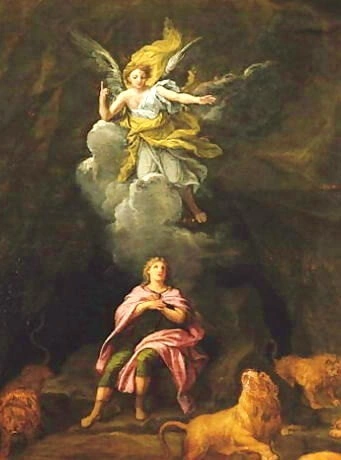1
Kuningas Belsassar laittoi suuret pidot tuhannelle ylimyksellensä, ja hän joi viiniä näiden tuhannen edessä.
2
Kun viini oli makeimmillaan, käski Belsassar tuoda ne kulta-ja hopea-astiat, jotka hänen isänsä Nebukadnessar oli ottanut Jerusalemin temppelistä, että kuningas ja hänen ylimyksensä, hänen puolisonsa ja sivuvaimonsa joisivat niistä.
3
Silloin tuotiin ne kulta-astiat, jotka oli otettu temppelistä, Jumalan huoneesta, Jerusalemista, ja niistä joivat kuningas ja hänen ylimyksensä, hänen puolisonsa ja sivuvaimonsa.
4
He joivat viiniä ja ylistivät kultaisia ja hopeisia, vaskisia, rautaisia, puisia ja kivisiä jumalia.
5
Sillä hetkellä ilmestyivät ihmiskäden sormet ja kirjoittivat kuninkaan palatsin kalkitulle seinälle, vastapäätä lampunjalkaa, ja kuningas näki käden, joka kirjoitti.
6
Silloin kuninkaan kasvot kalpenivat, ja hänen ajatuksensa peljästyttivät hänet; hänen lanteittensa nivelet herposivat, ja hänen polvensa tutisivat.
7
Kuningas huusi kovalla äänellä ja käski tuoda noidat, kaldealaiset ja tähtienselittäjät. Kuningas lausui ja sanoi Baabelin tietäjille: "Kuka ikinä voi lukea tämän kirjoituksen ja ilmoittaa minulle sen selityksen, hänet puetaan purppuraan, ja hänen kaulaansa pannaan kultakäädyt, ja hän on oleva yksi valtakunnan kolmesta valtamiehestä".
8
Silloin tulivat kaikki kuninkaan viisaat, mutta he eivät voineet lukea kirjoitusta eivätkä ilmoittaa kuninkaalle sen selitystä.
9
Kuningas Belsassar peljästyi silloin suuresti, ja hänen kasvonsa kalpenivat, ja hänen ylimyksensä tyrmistyivät.
10
Kuninkaan äiti tuli kuninkaan ja hänen ylimystensä puheen tähden pitohuoneeseen. Kuninkaan äiti lausui ja sanoi: "Eläköön kuningas iankaikkisesti! Älkööt sinun ajatuksesi peljättäkö sinua, älköötkä kasvosi kalvetko.
11
Sinun valtakunnassasi on mies, jossa on pyhien jumalien henki ja jolla sinun isäsi päivinä havaittiin olevan valistus ja ymmärrys ynnä viisaus, samankaltainen kuin jumalien; hänet asetti isäsi, kuningas Nebukadnessar, tietäjäin, noitien, kaldealaisten ja tähtienselittäjäin päämieheksi-sinun isäsi, kuningas-
12
sentähden, että erinomainen henki ja tieto ynnä myös taito selittää unia, arvata arvoituksia ja ratkaista ongelmia havaittiin juuri hänessä, Danielissa, jolle kuningas oli antanut nimen Beltsassar. Kutsuttakoon nyt Daniel, niin hän ilmoittaa selityksen."
13
Silloin Daniel tuotiin kuninkaan eteen. Kuningas lausui ja sanoi Danielille: "Oletko sinä Daniel, joka on niitä juutalaisia pakkosiirtolaisia, mitkä minun isäni, kuningas, on tuonut Juudasta?
14
Minä olen kuullut sinusta, että sinussa on jumalien henki ja että sinussa on havaittu valistus, taito ja erinomainen viisaus.
15
Ja nyt tuotiin minun eteeni viisaat ja noidat lukemaan tätä kirjoitusta ja ilmoittamaan minulle sen selitys, mutta he eivät voineet sen selitystä ilmoittaa.
16
Mutta sinun minä olen kuullut voivan antaa selityksiä ja ratkaista ongelmia. Nyt siis, jos voit lukea kirjoituksen ja ilmoittaa minulle sen selityksen, niin sinut puetaan purppuraan, ja kultakäädyt pannaan sinun kaulaasi, ja sinä olet oleva yksi valtakunnan kolmesta valtamiehestä."
17
Silloin Daniel vastasi ja sanoi kuninkaalle: "Lahjasi pidä itse, ja antimesi anna toiselle. Mutta kirjoituksen minä luen kuninkaalle ja ilmoitan hänelle sen selityksen.
18
Sinä kuningas! Korkein Jumala antoi sinun isällesi Nebukadnessarille kuninkuuden, voiman, kunnian ja valtasuuruuden.
19
Ja sen voiman tähden, jonka hän oli hänelle antanut, vapisivat kaikki kansat, kansakunnat ja kielet ja pelkäsivät hänen edessään. Hän tappoi, kenen hän tahtoi, hän jätti henkiin, kenen hän tahtoi, hän ylensi, kenen hän tahtoi, hän alensi, kenen hän tahtoi.
20
Mutta kun hänen sydämensä paisui ja hänen henkensä kävi korskeaksi ja ylpeäksi, syöstiin hänet kuninkaalliselta valtaistuimeltansa, ja hänen kunniansa otettiin häneltä pois.
21
Hänet ajettiin pois ihmisten seasta, ja hänen sydämensä tuli eläinten sydämen kaltaiseksi; hänen asuntonsa oli villiaasien parissa, ja hän joutui syömään ruohoa niinkuin raavaat; hänen ruumiinsa kastui taivaan kasteesta, kunnes hän tuli tuntemaan, että korkein Jumala hallitsee ihmisten valtakuntaa ja asettaa sen päämieheksi, kenen hän tahtoo.
22
Mutta sinä, hänen poikansa Belsassar, et ole nöyryyttänyt sydäntäsi, vaikka tämän kaiken tiesit;
23
vaan sinä olet korottanut itsesi taivaan Herraa vastaan: hänen huoneensa astiat on tuotu sinun eteesi, ja sinä ja sinun ylimyksesi, sinun puolisosi ja sivuvaimosi olette juoneet niistä viiniä, ja sinä olet ylistänyt hopeisia ja kultaisia, vaskisia, rautaisia, puisia ja kivisiä jumalia, jotka eivät näe, eivät kuule eivätkä mitään tiedä. Mutta sitä Jumalaa, jonka kädessä on sinun henkesi ja kaikki sinun tiesi, sinä et ole kunnioittanut.
24
Sentähden on tämä käsi lähetetty hänen tyköänsä ja tämä kirjoitus kirjoitettu.
25
Ja tämä on kirjoitus, joka on tuonne kirjoitettu: 'Mene, mene, tekel, ufarsin'.
26
Ja tämä on sen selitys: mene merkitsee: Jumala on laskenut sinun valtakuntasi luvun ja on tehnyt siitä lopun.
27
Tekel: sinut on vaa'alla punnittu ja köykäiseksi havaittu.
28
Peres: sinun valtakuntasi on pirstottu ja annettu meedialaisille ja persialaisille."
29
Silloin Belsassar antoi käskyn, että Daniel oli puettava purppuraan ja kultakäädyt pantava hänen kaulaansa ja julistettava, että hän oli oleva yksi valtakunnan kolmesta valtamiehestä.
30
Samana yönä tapettiin Belsassar, kaldealaisten kuningas,
31
ja Daarejaves, meedialainen, sai haltuunsa valtakunnan ollessaan noin kuudenkymmenen kahden vuoden ikäinen.







